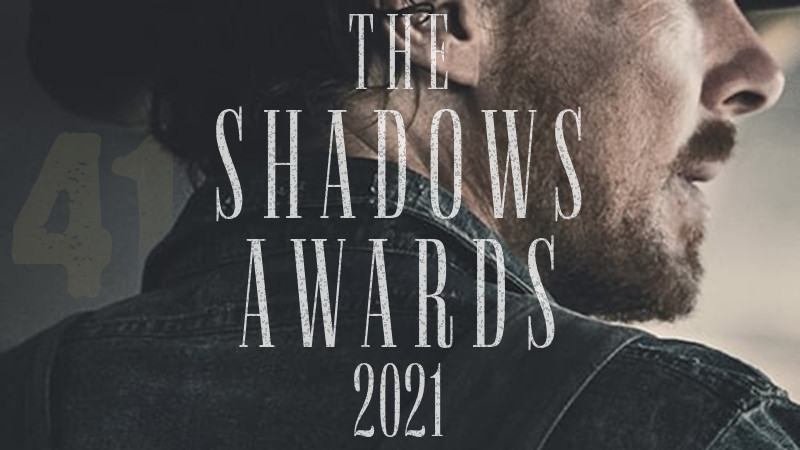| SHADOWS ON THE WALL | REVIEWS | NEWS | FESTIVAL | AWARDS | Q&A | ABOUT | TALKBACK | |||||
 Shadows off the beaten path Shadows off the beaten pathIndies, foreign, docs and shorts...
On this page:
GREAT FREEDOM |
PARALLEL MOTHERS |
THE WORST PERSON IN THE WORLD
| |||||
| See also: SHADOWS FILM FESTIVAL | Last update 19.Dec.21 | |||||
|
Great Freedom Grosse Freiheit Review by Rich Cline |  MUST
MUST  SEE SEE
| |||||
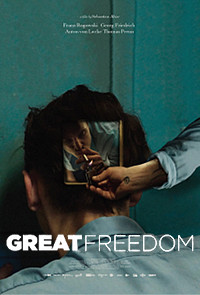 dir Sebastian Meise scr Thomas Reider, Sebastian Meise prd Benny Drechsel, Sabine Moser, Oliver Neumann with Franz Rogowski, Georg Friedrich, Anton von Lucke, Thomas Prenn, Thomas Stecher, Alfred Hartung, Thomas Wehling, Mex Schlupfer, David Burnell, Fabian Stumm, Joachim Schonfeld, Dirk Nocker release US Oct.21 ciff, UK 4.Mar.22 21/Austria 1h56 CANNES FILM FEST  Is it streaming? |
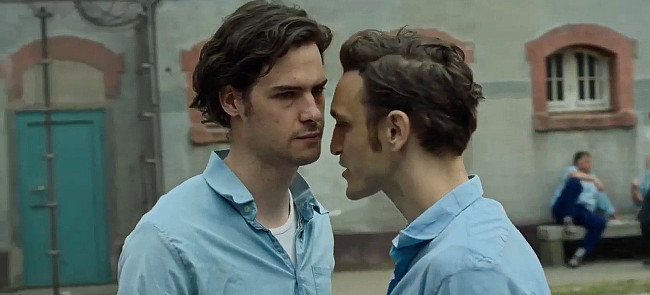 Earthy and understated, this Austrian prison drama tells a story of resilience amid harsh treatment of gay men in post-war Germany. Filmmaker Sebastian Meise keeps the film tightly focused on its characters, which makes it sometimes startlingly warm as it explores deeper connections between men who are prohibited from being themselves. Starting with Nazi persecution of homosexuality, the film's narrative covers the extension of those laws into the late 1960s. In 1968 Germany, Hans (Rogowski) is caught in spy camera footage and sent to prison for same-sex activity. But Hans has more than two decades experience of this. After being liberated from a concentration camp in 1945, he was immediately incarcerated under Nazi pre-war laws. His first cellmate is convicted killer Viktor (Friedrich), with whom Hans maintains an offbeat friendship as he goes in and out of prison over the years. In the cellblocks, he finds romance with Oskar (Prenn) in 1957, and then later in the 1960s with young teacher Leo (von Lucke). As it intercuts between Hans various incarcerations over the years, all of the usual jailhouse movie tropes are here, from cruel and/or friendly guards to prison-yard fights to brutal solitary confinements. But Meise keeps everything grounded and realistic, avoiding the usual heightened violence and emotion for something gritty and internalised. So sexual encounters are depicted as moments of tenderness in an ugly place. And the various relationships are never simplistic, sometimes surprising and often challenging preconceptions. Rogowski gives Hans remarkable dignity as a man who faces his life with matter-of-fact honesty. He knows that the system is grotesquely unjust, and is resigned to his fate. His interaction with Friedrich's gruff Viktor is fascinating, beautifully underplayed by both actors. Viktor's journey through the film has its own astonishing trajectory. And both Prenn and von Lucke bring vivid feelings to their scenes with Rogowski, as Oskar admires Hans' fearlessness and Leo longs for a normal life together. There's an unusual complexity in the way this film depicts masculinity, avoiding cliches and expectations to capture a realistic sense of male interaction during a particularly grim period in German history. Meise sometimes allows the tone to get a bit melodramatic, but the earthy undercurrents and direct interaction are fascinating, forcing the audience to adopt a new point of view. The title is the celebratory name of a gay bar in the final sequence, knowingly commenting on the legacy of persecution and the irony of freedom.
| ||||
|
Parallel Mothers Madres Paralelas Review by Rich Cline |  MUST
MUST  SEE SEE
| |||||
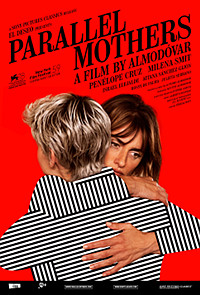 dir-scr Pedro Almodovar prd Agustin Almodovar, Esther Garcia with Penelope Cruz, Milena Smit, Israel Elejalde, Aitana Sanchez-Gijon, Rossy de Palma, Carmen Flores, Julieta Serrano, Adelfa Calvo, Julio Manrique, Ainhoa Santamaria, Inma Ochoa, Daniela Santiago release Sp 8.Oct.21, US 24.Dec.21, UK 28.Jan.22 21/Spain Pathe 2h00 Is it streaming? |
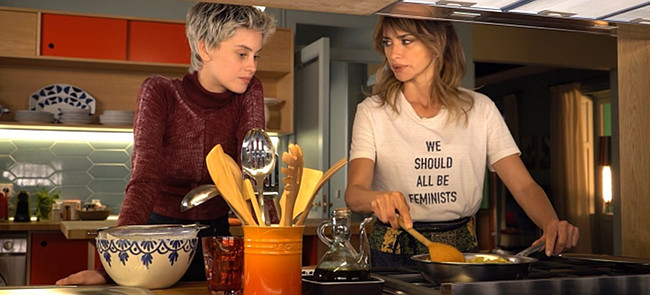 A layered melodrama about mothers and daughters, this film features another of Pedro Almodovar's astute collections of complex female characters. Without many of the filmmaker's usual flourishes, this is instead a soapy study of connections with some added Hitchcock-style tensions that are jaggedly emotional in nature. There's rather a lot going on here, sometimes perhaps too much to take in properly. But it carries a powerfully moving kick. In Madrid, 40-year-old photographer Janis (Cruz) has a spark with anthropologist Arturo (Elejalde), who is investigating the death of her great-grandfather during the war. And when she becomes pregnant, Janis decides to raise the child on her own. As she gives birth, her roommate is Ana (Smit), another single mother-to-be who's half Janis' age. She's living with her actress mother Teresa (Sanchez-Gijon), who is leaving to finally pursue success on the stage. Meanwhile, Janis discovers something that will change both her and Ana's lives. And she has second thoughts about keeping in contact with her. With a tone that shifts between wry comedy, intense emotion and much darker drama, the story takes in several generations of mothers and daughters as women remember their parents and grandparents while also facing issues relating to their daughters. Nothing about this is tidy: relationships are realistically hard to pin down, and there are some enormous moral dilemmas that divert characters in new directions. Almodovar creates a powerful sense of momentum under the surface, keeping the interaction sympathetic and often surprisingly low-key. This leaves the heightened emotionality to the gifted cast. Cruz and Almodovar have created a series of awesome on-screen women, and Janis is particularly wonderful. Her strength and vulnerability weave together with remarkably honesty, and her reactions to some momentous things that happen feel bracingly contradictory as well as oddly easy to understand. Smit is also superb as the more precarious Ana, a young woman whose back story is vividly seen through a combination of her strengths and weaknesses. And we could perhaps have used even more of the superb de Palma as Janis' sassy boss and lifelong friend. The film has a lot of knowing, powerfully meaningful observations to make about parents and children. But Almodovar saves the story's biggest impact for an exploration of how important it is to reconcile ourselves to previous generations and communal history. Interpersonal dramas grip the attention and provide a number of moving moments along the way. And the historical sweep of Arturo's excavations carries an even bigger electrical charge.
| ||||
|
The Worst Person in the World Verdens Verste Menneske
Review by Rich Cline |  MUST
MUST  SEE SEE
| |||||
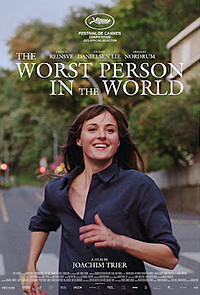 dir Joachim Trier scr Eskil Vogt, Joachim Trier prd Thomas Robsahm, Andrea Berentsen Ottmar with Renate Reinsve, Anders Danielsen Lie, Herbert Nordrum, Hans Olav Brenner, Helene Bjorneby, Vidar Sandem, Maria Grazia Di Meo, Lasse Gretland, Karen Roise Kielland, Marianne Krogh, Thea Stabell, Deniz Kaya release Nor 15.Oct.21, US 4.Feb.22, UK 25.Mar.22 21/Norway 2h07 CANNES FILM FEST TORONTO FILM FEST  SUNDANCE FILM FEST Now streaming... |
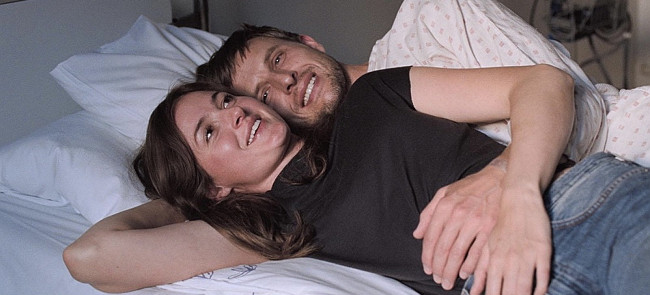 In a series of chapters, this Norwegian film traces four years in the life of a young woman trying to work out who she is. Skilfully directed by Joachim Trier, the story has a brisk, breezy pace that catches authentic feelings about how life rarely comes into focus how and when we want it to. Clever filmmaking brings unusual resonance to key sequences, finding staggering insight along the way. In Oslo, Julie (Reinsve) is studying medicine but thinking she'd rather be a psychologist. Or maybe a photographer. Then she falls for comic book artist Aksel (Lie), who encourages her to develop her writing skills. At a party, she sparks with climate researcher Eivind (Nordrum); they avoid starting an affair, but can't stop thinking about each other. All Julie knows is that she wants more out of life than she has. Although her attempts to plot a course leave her going in circles, trying to find space for a career, a relationship and possibly motherhood. With telling observations from an omniscient narrator, Julie is revealed as wonderfully complex, full of contradictions. She knows what she wants but hasn't a clue what to do with herself. Scenes revolve around superb conversations that ponder things like becoming a parent or the reasoning behind a breakup. It's a rare film that maintains a brightly entertaining tone while digging deeply into the things its characters are struggling to understand. It's an unusually nuanced film that provokes the audience to revise perceptions. The riveting storytelling highlights emotions and solidly grounds them. Reinsve has an astonishing natural presence, a multi-faceted young woman who is bracingly realistic as she grapples with her identity. Her relationships are refreshingly distinct with Lie's Aksel and Nordrum's Eivind, both hugely likeable. The way these characters interact is almost unnervingly realistic, and their conversations take twists and turns that continually unearth powerful observations and feelings. Much of the script skilfully weaves in female-empowerment themes without ever getting political about it, adding insight as filmmakers neuter Aksel's comic book characters when they adapt them for a movie. This is thoughtful, intelligent filmmaking that embraces conflicting perspectives on big issues to knowingly explore the bigger picture. And even more engaging is how it captures the subtleties of emotion that grow and linger as we connect with other people, and how genuinely opening up to someone else is a key to discovering ourselves.
| ||||

See also: SHADOWS FILM FESTIVAL © 2021 by Rich Cline, Shadows
on the Wall
HOME | REVIEWS | NEWS | FESTIVAL | AWARDS
| Q&A | ABOUT | TALKBACK | | ||||

